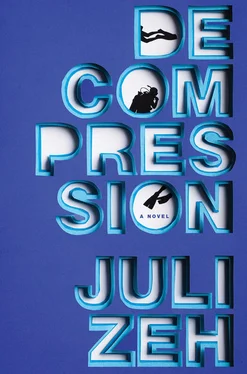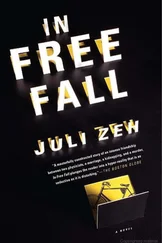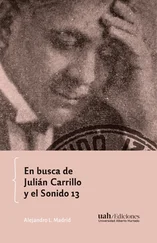“Suppose we disappeared with the boat. Would you die?”
“Almost certainly,” I said.
Theo let my arm go and nodded approvingly, as if giving me points for mortal danger. I let myself tip over backward. Before I hit the water, I thought I heard Jola’s voice call out, “Happy birthday, Sven!”
My fortieth. When I was a kid in school, there used to be stickers that read ATTENTION: TODAY IS THE BEGINNING OF THE REST OF YOUR LIFE. For the first and only time, that inane dictum seemed appropriate. It just needed an additional line to indicate whether it was a promise or a threat.
As soon as I was in the water, the familiar calm came over me. The weight of the dive tanks had disappeared. Under me there was neither firm ground nor empty air but instead a liquid three-dimensionality that I could traverse in any direction I wanted. No swells, visibility excellent. I grabbed the anchor cable and began a brisk descent. Soon the current caught me, and I hung on perpendicularly, like a banner in the wind. Sixty meters down, the first brief stop to change over to bottom gas. Soon afterward, the wrecked ship came into sight, a gigantic shadow in the everlasting semidarkness of the ocean floor.
I’d figured this dive would be an extraordinary experience. All the same, my own reaction surprised me. With every meter, the closer I sank to the wreck, the more my hands started to shake. I felt as though all the hairs on my body were standing up. The ghost ship below me was as long as a football field and broken into two pieces. The bow had separated from the rest of the ship and lay a little distance away from it. The ship’s waist appeared to be well preserved, except for a loading crane that had snapped off and fallen diagonally across the bridge. The stern loading crane still stood upright, as did, in fact, the entire steamer. The Fiedler , as I’d baptized her, looked as though a mighty hand had placed her there to wait for a secret future assignment. If — as I guessed— she’d sunk sometime during the Second World War, no human eye had looked on her for about seventy years. On the deck down there, people had once lived and worked, sung and quarreled, had harbored thoughts and feelings, and in the end had most probably gone to the bottom together with their ship. I was hovering above an inscrutable past that was principally, in the way of pasts, a graveyard. No one but the fish had taken care of those dead bodies. Maybe they were still to this day unaccounted for. Maybe there were grown grandchildren somewhere who believed Grandpa had absconded to America in the middle of the war and left Grandma alone with two little ones.
The most impressive feature of the Fiedler was, beyond a doubt, her enormous funnel, which towered at some distance from me. I decided to leave the anchor cable, swim over there, and negotiate the rest of my descent alongside the chimney. Because of the sunken ship’s imposing size and the strong current, I had to make sure I’d be able to find the cable again. The anchor would surely creep some distance over the seafloor; on the other hand, visibility was better than I’d expected that far down. I let go of the cable, battled against the current with strong fin strokes, and got my camera ready. The effort was worth it. I was looking down into a black maw big enough to swallow a cow. A dense school of sardines, as pliant as cloth, as agile as a single creature with a single will, wound around the funnel. When I got close, they formed dents and bubbles, but then they immediately went back to circling the chimney. One level down was a large battery of barracudas, too satiated to hunt. I pressed the shutter-release button. Those photographs would be the envy of the entire island.
I quickly completed the final stage of my descent. From this point on, time would speed by. I couldn’t spend more than twenty minutes at that depth, and twenty minutes was the blink of an eye, particularly considering the size of the object I proposed to investigate. I took a plastic bag from my pocket, inflated it with gas, and released it. It fluttered upward like a frantic jellyfish doing battle with a family of different-size air bubbles. The marker made a beeline for the surface, where Jola would see it and interpret its meaning: I’m down, everything okay .
Then I started to swim. Against the current, but at a leisurely pace, because haste underwater only used up gas, strength, and nerves. I swam along the ship’s steel walls, which were as high as a house and covered with a closed layer of mussels, sponges, and soft coral, here and there decorated with sea urchins and starfish. It was a living, breathing, and ever-hungry vestment that hardly offered a glimpse of the metal underneath. The barracudas watched me and found me boring. While I had to keep working my legs hard, they hung almost motionless in the current.
I saw the quarterdeck, the main deck, and the bridge. The lifeboats were all properly in place; everything had obviously happened very fast. I noted the signal bridge, the Morse lamp, and the radio mast, which was overgrown to the tiniest branch with mussels and anthozoans. I inadvertently broke off a little stony coral from the bulwark and felt ashamed. I took meticulous care not to get tangled in any of the long-lost fishing nets that clung to the wreck here and there like giant spiderwebs. A hole in the ship’s side allowed me to peer into the engine room. I reached the detached bow, which lay separate from the rest like a wrenched-off body part. The break was a colossal, gaping wound. I guessed the ship was a British collier, maybe a merchant vessel built in the Roaring Twenties and later put into service by the Allies. I’d have to come back here many times to look for the ship’s bell or the shipbuilder’s plaque, for identification plates in the engine room, for dishes or utensils embossed with the shipping company’s emblem, for the manufacturers’ marks on the engine telegraphs and the binnacle, before the secret of the Fiedler would be unlocked.
It was time to return to the anchor cable. I was slowly reaching the point of sensory overload anyway. There were too many impressions. I wasn’t processing them anymore, only registering them. Ground tackle, king posts, fan cowls, deckhouse. Thousands of dolphinfish, amusing themselves by pursuing me. Once again, the ship’s screw captured my attention. It was a four-blade bronze propeller with a diameter of about five meters. The rudder, which had been swiveled hard to the left, could have told an entire story. And I was curious to hear it. I wanted to sit on the seafloor and grow gills so that I could breathe freely. I wanted to cast off my equipment and move into the captain’s cabin. The barracudas would surely have had nothing against that; there was room enough for all. The wreck was as big as an apartment complex. I could have made myself at home in there. After all, I knew how life worked underwater. It occurred to me that during the previous several minutes, for the first time in days, I hadn’t thought about either Jola or Antje or Theo. That was the pass I’d come to. Jola and Theo had brought Germany to the island — and with it a war that wasn’t mine, that had nothing to do with me. Nonetheless, they’d turned me into a combatant. Up there on the land, there was no longer any refuge I could escape to. The whole island was a battlefield. I couldn’t stay out of it anymore. My living space had been destroyed, like the habitat of a creature on the way to extinction. Down here was the only place I could still be. Everything felt right here. The planet Fiedler , discovered by myself. A realm nobody could follow me into. All I’d have to do was take off my equipment, breathe through gills, and …
I reached the anchor cable. Twenty-two minutes; deepest point, 109 meters. Not good, but acceptable. Apparently I’d forgotten the time for a few moments while contemplating the ship’s screw. I was breathing too fast — I had to get a grip on that. From this point on, the old rule from the Bible held good: don’t turn around, don’t look back. I couldn’t be interested in the wreck anymore. Now my entire focus must be on my measuring instruments, with whose help I had to bring the factors of depth, time, and gas mixture into perfect proportion.
Читать дальше












